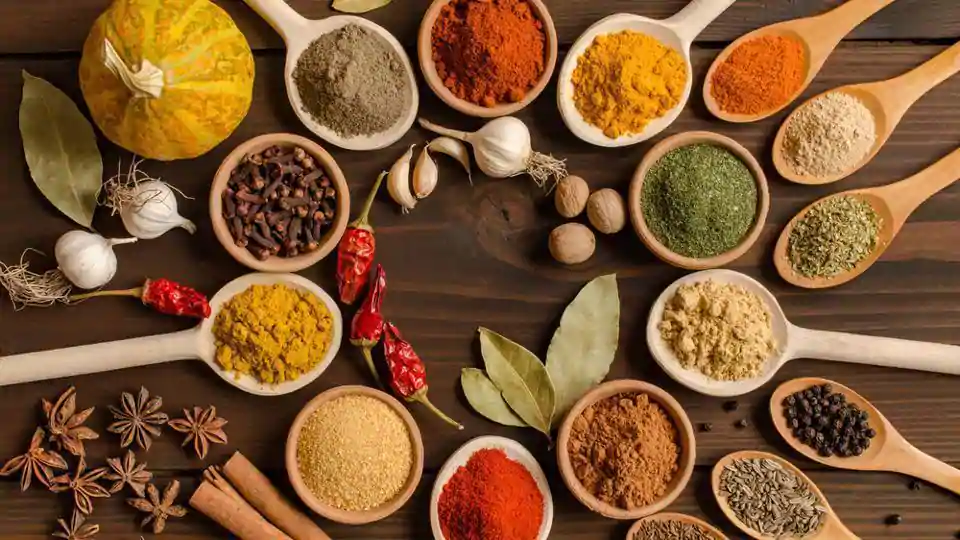HERBS AND SPICES FOR HEALTHY EATING

Winter has had its challenges…. The weather and the lack of fresh produce, for starters. However, using the root vegetables that are available, with beans or meats for stews, can fill your home with the wonderful aromas of spices. When you cook, how do you season your food? Do you only think about salt and pepper? There’s a whole world of herbs and spices - they're easy to find and can help you liven up your food, especially if you're cutting back on salt, fat, or sugar. And that could help your waistline, blood pressure, and overall health. So does all this mean you can solve your health issues by sprinkling spices on your food?
Herbs can enhance the flavours of your food, and provide health benefits, while at the same time, preventing bacteria growth on meats! They can be easy to grow and dry if that’s your desire. Good quality herbs make good quality dried, roasted spices. In fact, Moncton’s very own Joanne Rolfe, of Posh Nosh Spices (you can find her at the Moncton Market and her products at several stores around NB), brings in nearly all organic whole raw herbs, roasts them, grinds them and puts them together in delicious blends. Here at Ford’s, we carry her “Anti-Inflammatory” blend, which we call Turmeric Spice Blend.
The ingredients: Turmeric, oregano, thyme, rosemary, sage, ginger, garlic, onion, and black peppercorns, have been researched and shown to have anti-inflammatory qualities.
Individually, these herbs and vegetables have been known and shown to have health benefits. In ancient times, many of these were used for medicine. As Hippocrates said, “Let Food be Thy Medicine and Medicine be thy Food”. Since then, studies performed by scientists have found truth in the wisdom of old, and have discovered why they works as they do. It’s no wonder, then, these are combined for a not only delicious, but healthful combination of herbs for your pleasure in cooking. A little history and some of the known, as well as presumed health benefits of each of these ingredients are included in the next few blogs (we will publish a blog on individual spices every few days or so). Some of these are well-studied and some have indicated further studies are needed on humans. With each one, there’s a tidbit on how to use it separately, as well. However, together, they work synergistically.
The question is: can adding spices to your food really provide any health benefits, and if so, how much would be needed for any effects. The answer is not quite as simple as sprinkling a little spice on your food. If you are in need of the health benefits these herbs and spices provide, the amount needed will be much more, and better consumed encapsulated (Curcumin, for example) or in tinctures. (If you are on medications for these purposes, do NOT stop them or add herbal remedies without speaking with your trusted healthcare provider). However, it will also be a good idea to try to make your diet anti-inflammatory. In this way, you will not be adding any inflammation to your body. Furthermore, these herbs may replace salt and other spices you might previously have used, that are UNhealthy for you. Experiment with different spices and herbs to see what you like and what tastes good on specific foods. One way to taste individual herbs and spices is to mix some with olive oil and use it as a dipping oil. Herbs and spices are packed with nutrition, antioxidants and other phytochemicals that can add therapeutic value to your food. Because each herb and spice is unique in its nutritional make up, the more variety you use, the better. So… use the spices, drink the herbal teas, eliminate or severely cut back on sugar, alcohol, processed oils, the “dirty” whites, and other processed foods, and you will help your body fight inflammation and free radicals, therefore reducing your risk of chronic diseases.
Tips for Buying, Using, and Storing Dried Herbs
Store dried herbs in a cool, dark place, especially if they come in a clear glass container.
If a recipe calls for fresh herbs and you're using dried instead, use about 1/3 less. If the recipe calls for a tablespoon of chopped fresh herbs, a teaspoon of dried herbs will do.
But dried herbs lose flavor over time. If stored correctly, they will last about a year. Sniff the herbs before you use them. If you can't smell anything, they're past their prime.
The main thing it mentions, though, is that by using pure, and when possible, organic, spices, made from fresh and dried herbs, you are avoiding the chemicals used in many commercial blends. They can also enhance your foods, not only with flavour, but by making the good properties of the foods better and helping to combat the bad properties of the foods.
The information in this blog is intended for educational purposes only. It is not meant for diagnosing or treating any disease state. Herbs have historically been used as medicine. They can act like medicine in your body, especially at large doses. If you have health conditions for which you are on medication, please check with your healthcare provider for safety precautions, possible side effects and interactions. There ARE certain people who should NOT use Turmeric or some of the other herbs and spices mentioned in this series of blogs. If you have any questions about any of the herbs and spices mentioned in this article, please contact Ellen Chapman, R.H.N. at This email address is being protected from spambots. You need JavaScript enabled to view it..






